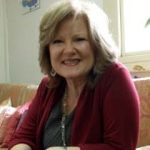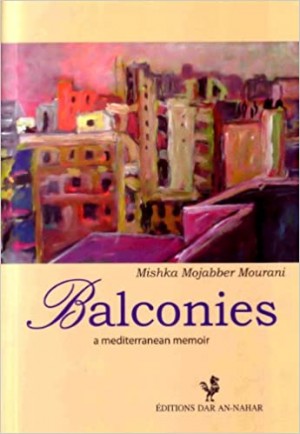Mishka Mojabber Mourani was born in Egypt of Greek and Lebanese parents. She moved to Lebanon and then emigrated to Australia as a teenager. She returned to Beirut to continue her studies at the American University of Beirut. She spent the Lebanese war years in Lebanon, and started writing in 1975. She speaks five languages and her writing reflects the themes of war, identity, exile and gender issues.
When the war ended in Lebanon in 1991, Mishka Mojabber Mourani published a poetry collection – LEST WE FORGET: LEBANON 1975-1990. She has also published a short story in HIKAYAT: SHORT STORIES BY LEBANESE WOMEN [Telegram books, UK] in 2006.
She published BALCONIES: A MEDITERRANEAN MEMOIR [Dar An-Nahar, Beirut 2009], and her work has appeared in LEBANON THROUGH WRITERS’ EYES- an anthology published by Eland, UK in 2009; HABITER BEYROUTH? PARCOURS D’ECRITURE [Assabil, Beirut 2010] ; and LA MEDITERRANEE AU CARREFOUR DES MOTS [Assabil, Beirut 2011]. Also in 2011 she collaborated with poet Antoine Boulad and artist Mohammad Rawas on the book FAISEURS DE REALITES [MAKER OF REALITIES], which she translated from French to English. In March 2012 her short story, ‘An Old Box of Antiques’ was published in the literary review MUSED. She has also had two pieces published online by ARABIC LITERATURE IN ENGLISH: The Global Story Behind a Bilingual Book of Poems Teta, Did You Know Aleppo? Her recent writing deals with the themes of war, identity, exile and gender issues.
BALCONIES: A MEDITERRANEAN MEMOIR:
Mishka Mojabber Mourani's Balconies is not only a memoir but also a collage of photos, letters, fiction and reportage. In it the author explores the themes of war, exile, identity, heritage and multicultural identities. Mojabber Mourani is a Levantine: a citizen of the eastern Mediterranean who speaks five languages and who was born in Egypt of Greek and Lebanese parentage. At the mercy of the political upheavals that rattle her world, she recounts her experiences as an emigrant to Australia, and as a survivor of a fifteen-year war that devastated her beloved Beirut, deriving purpose and optimism from her work as an educator. Throughout the book, she also celebrates life, resilience, and hope in the face of adversity and instability. She tells her stories because they need to be told, and because they need to be passed on. She consciously documents the process of identity formation and the choices that her multiculturalism impose on her. Balconies also explores cultural and gender issues and observes the interactions between the urban landscapes and political climate of the cities she has lived in. The various vignettes and observations in the book are held together by the unifying thread of balconies. The author observes that the great and ancient cities of Alexandria, Athens and Beirut place a unique emphasis on their verandas: the place from which one sees the world. They are the vantage points and social spaces of their inhabitants, but also private spaces for introspection and reflection. They are also the urban dweller's means of communion with nature. Balconies is a book about the complexities of life, and the defining moments that make us who we are. It is, above all, a book that celebrates survival, diversity and resilience.
A translation from Balconies appeared in Al Hayat newspaper
For reviews and news of "Balconies," please visit http://balconies2009.blogspot.com/
ALONE, TOGETHER
Alone Together is a bilingual poetry collection co-authored by Mishka Mojabber Mourani and Aida Yacoub Haddad. It was published by Kutub, Beirut, in 2012.
The poetic conversation between Aida and Mishka started decades ago and continued intermittently across three continents and one long war. “Alone, Together” is the result of a dialogue that started, when Aida translated to Arabic a number of poems from a book that Mishka had published, entitled “Lest We Forget: Lebanon 1975-1990.” Aida was living in Greece and air-mailed the translation to Mishka, who had remained in Beirut.
Aida moved to Washington DC. The thread of that dialogue picked up again years later, when Mishka visited Aida, who shared some of her poems, written in Arabic. Moved by the writing, Mishka translated the poems to English, “the better to understand them,” as she told her friend. Instead of sending them by “snail” mail, however, Mishka emailed them to Aida.
Their voyages were very different, Mishka having emigrated to Australia and returned to Lebanon to stay throughout the Lebanese war. As she says in the introduction to “Alone, Together,” ‘both of us have been on long and tortuous journeys. We have navigated the seas of war and loss of many sorts, and our ports of call have lacked permanence. We have assumed identities and abandoned them. Perhaps …this book will shed some light on who we are. I have reveled in this virtual conversation, you in Arabic from the US, and I in English from Lebanon. And the journey continues…’




